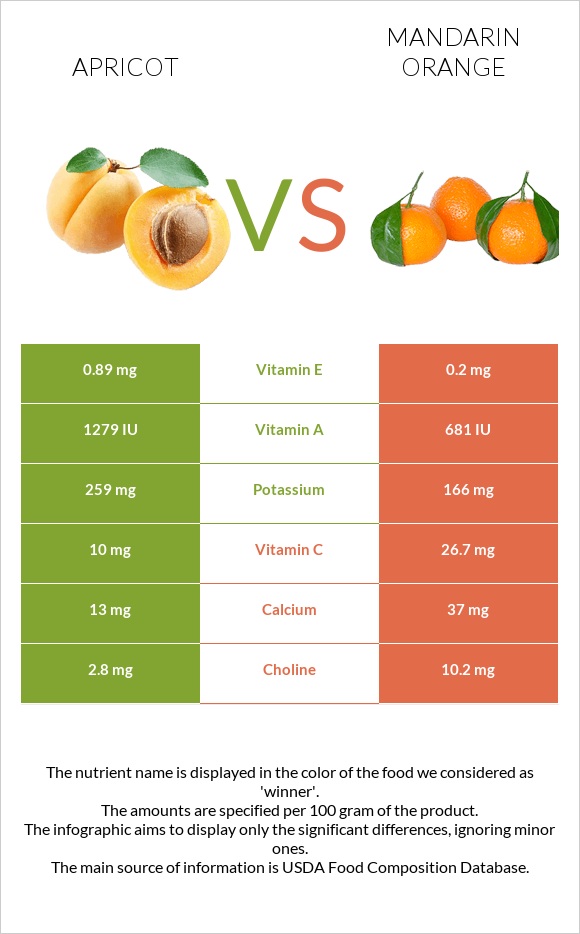Apricot vs. Mandarin orange — In-Depth Nutrition Comparison
Compare
How are apricots and mandarin oranges different?
- Apricots are higher in vitamin A; however, mandarin oranges are richer in vitamin C.
- Daily need coverage for vitamin C for mandarin oranges is 19% higher.
- Apricots contain 4 times more vitamin E than mandarin oranges. While apricots contain 0.89mg of vitamin E, mandarin oranges contain only 0.2mg.
- Apricots have a lower glycemic index (34) than mandarin oranges (47).
Apricots, raw and Tangerines, (mandarin oranges), raw are the varieties used in this article.
Infographic

Infographic link
Mineral Comparison
Mineral comparison score is based on the number of minerals by which one or the other food is richer. The "coverage" charts below show how much of the daily needs can be covered by 300 grams of the food.
| Contains more PotassiumPotassium | +56% |
| Contains more IronIron | +160% |
| Contains more CopperCopper | +85.7% |
| Contains more ZincZinc | +185.7% |
| Contains more PhosphorusPhosphorus | +15% |
| Contains less SodiumSodium | -50% |
| Contains more ManganeseManganese | +97.4% |
| Contains more MagnesiumMagnesium | +20% |
| Contains more CalciumCalcium | +184.6% |
Vitamin Comparison
Vitamin comparison score is based on the number of vitamins by which one or the other food is richer. The "coverage" charts below show how much of the daily needs can be covered by 300 grams of the food.
| Contains more Vitamin AVitamin A | +182.4% |
| Contains more Vitamin EVitamin E | +345% |
| Contains more Vitamin B3Vitamin B3 | +59.6% |
| Contains more Vitamin KVitamin K | +∞% |
| Contains more Vitamin CVitamin C | +167% |
| Contains more Vitamin B1Vitamin B1 | +93.3% |
| Contains more Vitamin B6Vitamin B6 | +44.4% |
| Contains more FolateFolate | +77.8% |
All nutrients comparison - raw data values
| Nutrient |  |
 |
DV% diff. |
| Vitamin C | 10mg | 26.7mg | 19% |
| Vitamin A | 96µg | 34µg | 7% |
| Vitamin E | 0.89mg | 0.2mg | 5% |
| Copper | 0.078mg | 0.042mg | 4% |
| Potassium | 259mg | 166mg | 3% |
| Iron | 0.39mg | 0.15mg | 3% |
| Vitamin K | 3.3µg | 0µg | 3% |
| Calcium | 13mg | 37mg | 2% |
| Manganese | 0.077mg | 0.039mg | 2% |
| Vitamin B1 | 0.03mg | 0.058mg | 2% |
| Vitamin B6 | 0.054mg | 0.078mg | 2% |
| Folate | 9µg | 16µg | 2% |
| Fructose | 0.94g | 2.4g | 2% |
| Protein | 1.4g | 0.81g | 1% |
| Carbs | 11.12g | 13.34g | 1% |
| Fiber | 2g | 1.8g | 1% |
| Zinc | 0.2mg | 0.07mg | 1% |
| Vitamin B3 | 0.6mg | 0.376mg | 1% |
| Choline | 2.8mg | 10.2mg | 1% |
| Calories | 48kcal | 53kcal | 0% |
| Fats | 0.39g | 0.31g | 0% |
| Net carbs | 9.12g | 11.54g | N/A |
| Magnesium | 10mg | 12mg | 0% |
| Sugar | 9.24g | 10.58g | N/A |
| Phosphorus | 23mg | 20mg | 0% |
| Sodium | 1mg | 2mg | 0% |
| Selenium | 0.1µg | 0.1µg | 0% |
| Vitamin B2 | 0.04mg | 0.036mg | 0% |
| Vitamin B5 | 0.24mg | 0.216mg | 0% |
| Saturated fat | 0.027g | 0.039g | 0% |
| Monounsaturated fat | 0.17g | 0.06g | 0% |
| Polyunsaturated fat | 0.077g | 0.065g | 0% |
| Tryptophan | 0.015mg | 0.002mg | 0% |
| Threonine | 0.047mg | 0.016mg | 0% |
| Isoleucine | 0.041mg | 0.017mg | 0% |
| Leucine | 0.077mg | 0.028mg | 0% |
| Lysine | 0.097mg | 0.032mg | 0% |
| Methionine | 0.006mg | 0.002mg | 0% |
| Phenylalanine | 0.052mg | 0.018mg | 0% |
| Valine | 0.047mg | 0.021mg | 0% |
| Histidine | 0.027mg | 0.011mg | 0% |
Macronutrient Comparison
Macronutrient breakdown side-by-side comparison
Protein:
1.4 g
Fats:
0.39 g
Carbs:
11.12 g
Water:
86.35 g
Other:
0.74 g
Protein:
0.81 g
Fats:
0.31 g
Carbs:
13.34 g
Water:
85.17 g
Other:
0.37 g
| Contains more ProteinProtein | +72.8% |
| Contains more FatsFats | +25.8% |
| Contains more OtherOther | +100% |
| Contains more CarbsCarbs | +20% |
~equal in
Water
~85.17g
Fat Type Comparison
Fat type breakdown side-by-side comparison
Saturated fat:
Sat. Fat
0.027 g
Monounsaturated fat:
Mono. Fat
0.17 g
Polyunsaturated fat:
Poly. Fat
0.077 g
Saturated fat:
Sat. Fat
0.039 g
Monounsaturated fat:
Mono. Fat
0.06 g
Polyunsaturated fat:
Poly. Fat
0.065 g
| Contains less Sat. FatSaturated fat | -30.8% |
| Contains more Mono. FatMonounsaturated fat | +183.3% |
| Contains more Poly. FatPolyunsaturated fat | +18.5% |
Carbohydrate type comparison
Carbohydrate type breakdown side-by-side comparison
Starch:
0 g
Sucrose:
5.87 g
Glucose:
2.37 g
Fructose:
0.94 g
Lactose:
0 g
Maltose:
0.06 g
Galactose:
0 g
Starch:
0 g
Sucrose:
6.05 g
Glucose:
2.13 g
Fructose:
2.4 g
Lactose:
0 g
Maltose:
0 g
Galactose:
0 g
| Contains more GlucoseGlucose | +11.3% |
| Contains more MaltoseMaltose | +∞% |
| Contains more FructoseFructose | +155.3% |
~equal in
Starch
~0g
~equal in
Sucrose
~6.05g
~equal in
Lactose
~0g
~equal in
Galactose
~0g




